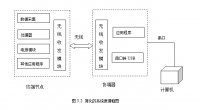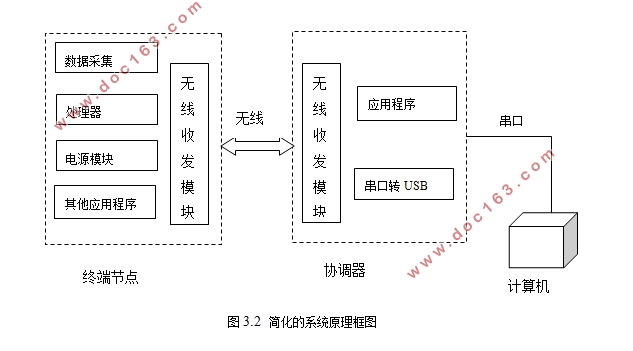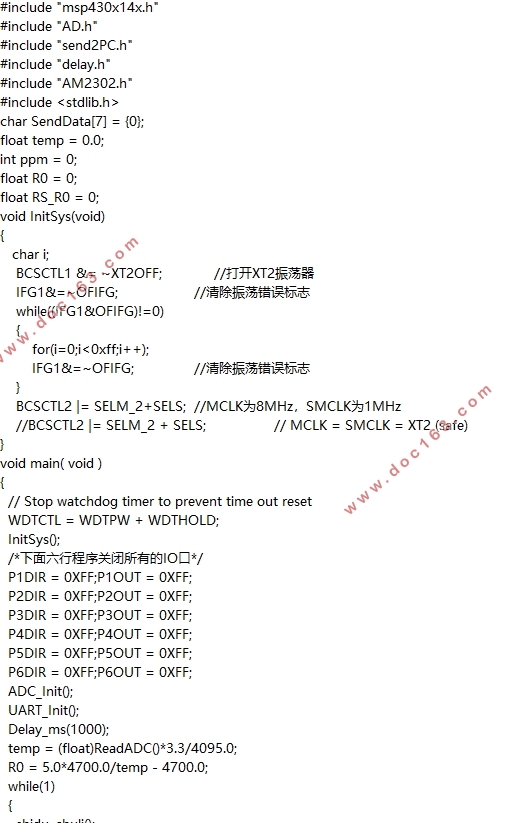基于无线传感器网络的矿井安全生产监控系统设计

基于无线传感器网络的矿井安全生产监控系统设计(论文14000字,程序代码)
摘要:煤炭是我国的主体能源,由于煤矿环境恶劣,容易发生事故,本课题设计了一个基于无线传感器网络的矿井安全生产监控系统。比较了各种短距离无线通信技术后,我们选择了ZigBee无线通信技术,在ZigBee射频模块采用了CC2530芯片。根据低功耗、高稳定性的的要求,本次设计的系统选择了DHT11温湿度传感器和MQ-5烟雾传感器来检测矿井中最重要的三个因素:温度、湿度和瓦斯浓度,采用MSP430F149单片机作为终端节点的微处理器。使用IAR Embedded Workbench编译器编程,LabVIEW编写上位机。最终设计出一个监控系统,具有模拟量、开关量、累积量采集、传输、存储、处理、显示、报警、控制等功能,用于煤矿通风安全及生产环节监控。
关键词:无线传感器网络;ZigBee;安全监控
Coal mine safety monitoring system based on Wireless Sensor Networks
Yin Jingfei
Abstract:Coal is the main energy of our country. Because of the bad environment of coal mine and the accident, this paper designs a mine safety monitoring system based on wireless sensor networks.After comparing all kinds of short distance wireless communication technology, we choose the ZigBee wireless communication technology and uses the CC2530 chip in the ZigBee radio frequency module.According to the requirements of low power and high stability, the design of the system selected the DHT11 temperature and humidity sensor and MQ-5 smoke sensor to detect the most important factors in the mine including temperature, humidity and gas concentration.The system uses MSP430F149 single chip microcomputer as terminal node.I use IAR Embedded Workbench and LabVIEW as compiler.Finally, a monitoring system is designed, which has the functions of analog quantity, switch quantity, accumulated quantity acquisition, transmission, storage, processing, display, alarm, control and so on.
Key words: Wireless Sensor Networks,ZigBee;Security monitoring
[来源:http://www.doc163.com]


目 录
1 绪论 3
1.1 论文背景及意义 3
1.2 安全监控系统研究现状 3
1.3 论文研究的主要内容及安排 4
2 相关技术研究 5
2.1 无线传感器网络简介 5
2.2 无线传感器网络的发展现状和应用前景 5
2.3 ZigBee技术简介 6
2.4 几种短距离无线通信技术的比较 7
2.5 ZigBee协议 9
3 系统总体设计 10 [资料来源:http://www.doc163.com]
3.1 系统需求分析 10
3.2 系统总体设计 10
3.3 软硬件设计要求 11
4 硬件设计 12
4.1 微处理器模块设计 12
4.2 数据采集模块设计 13
4.2.1 温湿度传感器DHT11 13
4.2.2 瓦斯传感器MQ-5 15
4.3 无线通信模块设计 15
4.3.1 CC2530射频芯片 15
4.3.2 串口转USB模块设计 16
4.3.3 供电模块设计 17
5 软件设计 18
5.1 软件开发平台简介 18
5.1.1 IAR Embedded Workbench编译器 18
5.1.2 LabVIEW 19
5.2 软件程序设计 21
5.2.1 发送数据 21
5.2.2 AD转换 21
5.2.3 湿度处理[23] 21
5.2.4 终端节点程序 22
5.3 上位机设计 22 [资料来源:http://Doc163.com]
6 系统测试及结果分析 25
6.1 系统测试 25
6.2 测试结果分析 27
7 总结 29
参考文献: 30
致谢 31 [来源:http://www.doc163.com]
